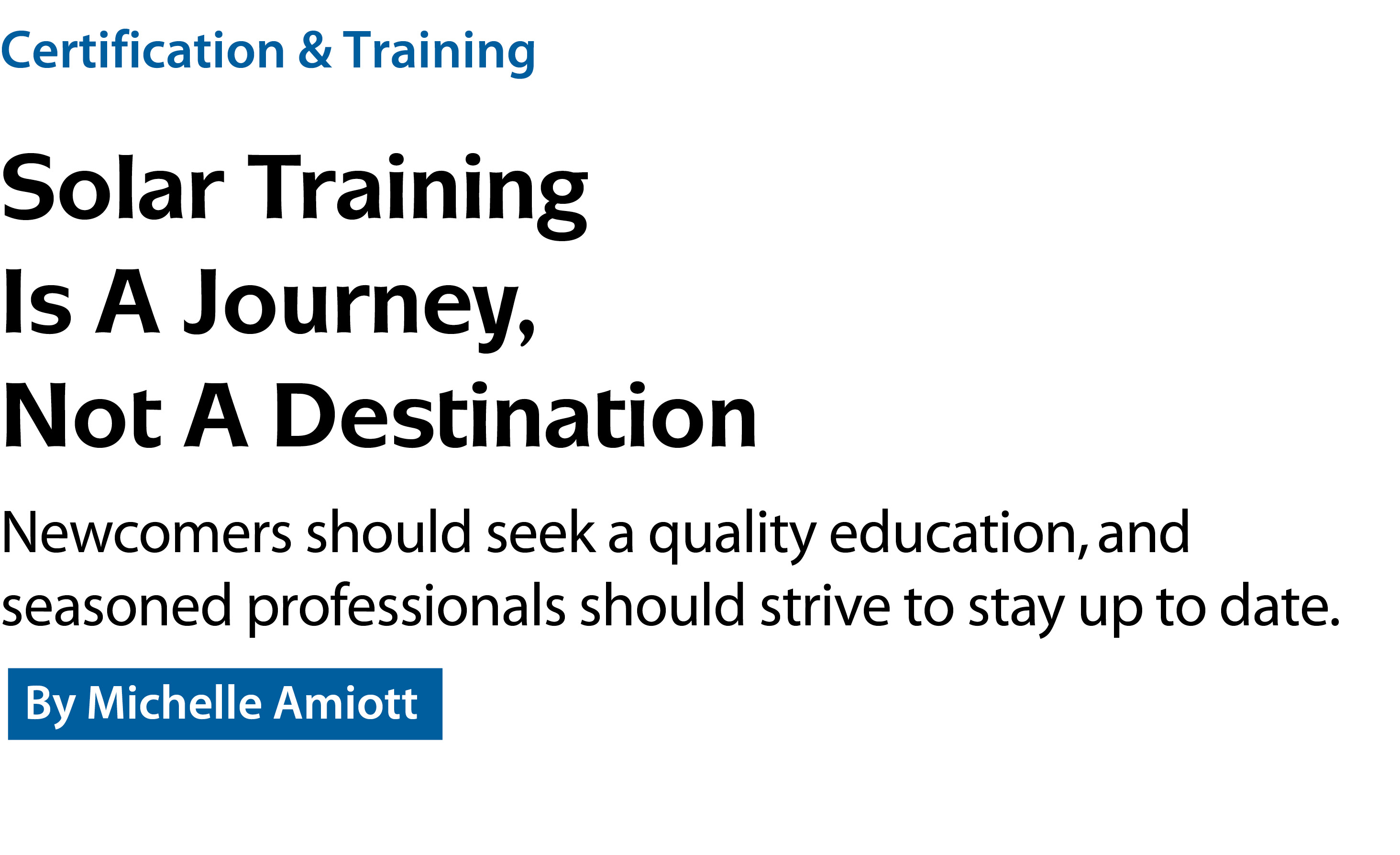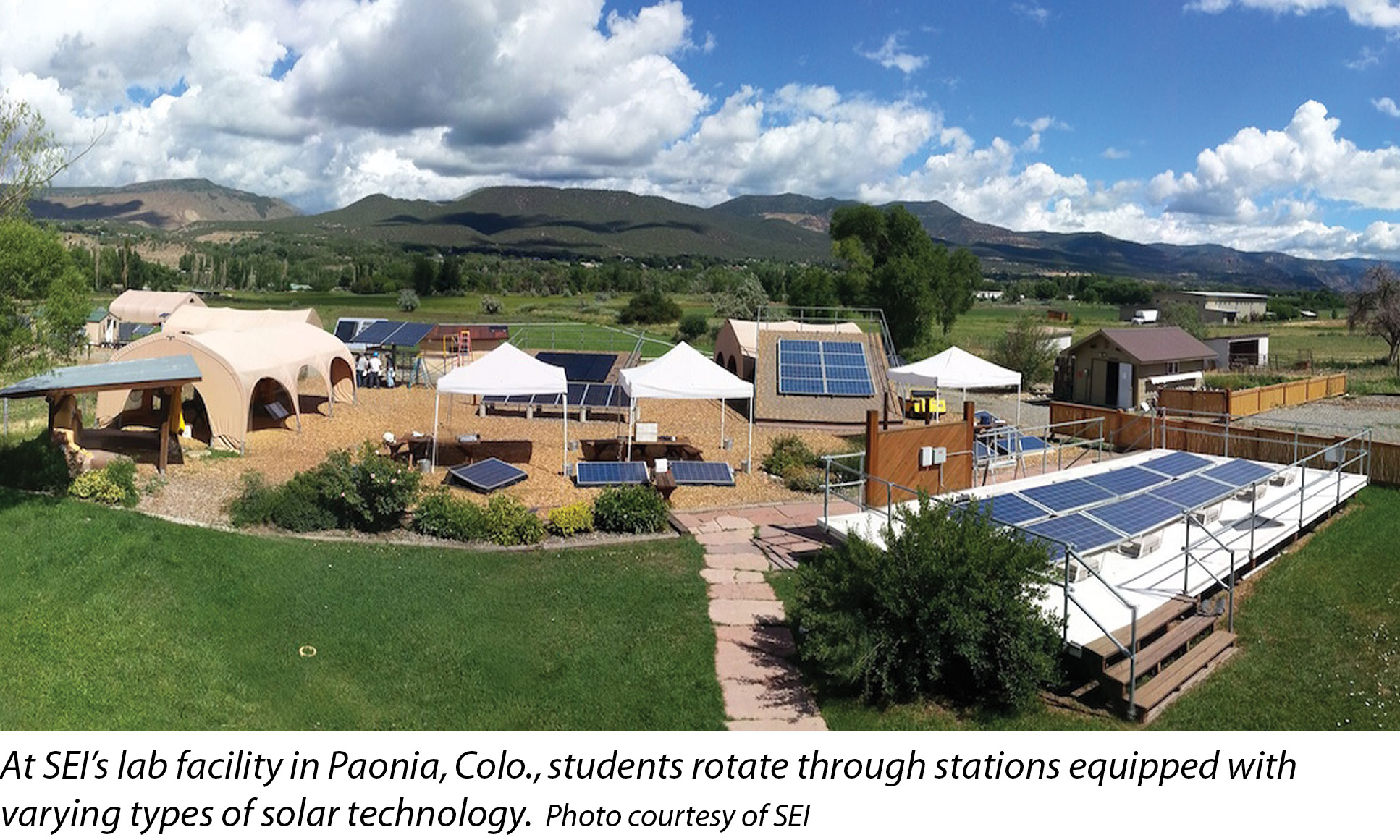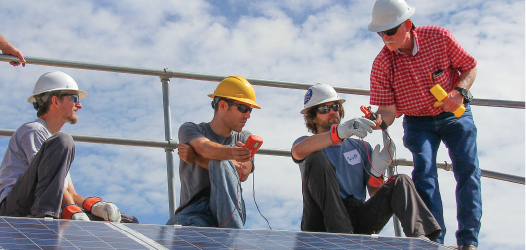

301 Moved Permanently
If you’re serious about getting a start or elevating your career in the solar industry, formal training and continuing education are the cornerstones to your success. With that in mind, it is unrealistic to think that you can take one or two introductory-level courses or volunteer a weekend of your time on a solar install job site and that’s all the education you’ll ever need.
As you begin looking into various training options, you will immediately see there are different approaches. After providing renewable energy training for over 25 years, we at nonprofit Solar Energy International (SEI) have worked to address the role of training in creating a highly skilled, clean energy workforce needed to sustain a prospering solar industry. Our staff can testify to the benefits of training from your first PV system install throughout your advancement as a seasoned solar professional.
Scott Martin, SEI’s online course manager, says, “First, I think it’s important to understand that the PV industry is a fairly complex and potentially dangerous field. After all, we’re talking about designing and installing electrical power generation systems that, in many cases, will be connected to the utility grid and will be sitting on the roofs of residential homes, commercial buildings and on the ground. The electrical and roofing trades are two of the most dangerous professions, and now you’re combining the two. Without extensive initial and ongoing training, it’s pretty easy to imagine all of the things that could go wrong.
“The need for ongoing training throughout your career becomes pretty obvious once you begin working in the industry,” continues Martin. “I think anyone who has been working in this field for a while will tell you: The more you learn, the more you find out how much you don’t know.”
Transferable skills & knowledge
Everyone comes to this field with different backgrounds, existing skills, experience and education levels. Many have no previous electrical or construction knowledge. Those who do may have little or no experience with solar photovoltaic technologies. Designers, installers and technical salespeople all need to be knowledgeable in these areas, albeit at different levels.
“Even experienced electricians can benefit from specialized solar training. Solar installations can differ significantly from typical residential and commercial building wiring - in particular, working with high-voltage DC, getting up to speed with industry best practices for installing PV systems and Section 690 of the National Electric Code,” says Martin.
In addition to the technical aspects of solar, understanding safety is a critical part of the need for initial and ongoing training for anyone who will be on or around a job site. Both electrical and construction safety are essential knowledge in this field.
Even the Department of Labor and Employment in Colorado, where we are based, is emphasizing the need for a skilled workforce in the solar industry. The State of Colorado recently passed the WORK Act to ensure critical career sectors have a thriving network of well-trained practitioners in the state.

“We are excited that the State of Colorado selected our training and outreach program to ensure a highly skilled workforce here in our home state,” comments Chris Turek, director of marketing for SEI. “We are calling this training and outreach program Solar Ready Colorado. The program provides training and career resources for those who have transferable skills wanting to get into this industry or for solar professionals who want to take their careers to the next level. We will be targeting people in related professions, like the electrical and construction trades, to get them into our training program and help them integrate into the solar workforce.
“What might be the most exciting part of being selected for this program is the fact that the state has taken notice to the rapid growth of this career field and wants to make sure the workforce is well prepared not only for the jobs available today, but also for the growth of jobs in the future.”
Trends
According to research done by the Solar Foundation, employment in the U.S. solar industry has grown by more than 123% in the past six years. The installation sector of the industry has more than doubled since 2010 and continues its upward trend. Companies in strong solar markets are hiring at a feverish pace. But growth at the expense of quality is not good for anyone - employers, professionals and customers alike.
If you asked any of these employers, you would surely hear that they value training and continuing education, but there are still differing opinions on the type of job readiness and technical literacy needed for new solar employees. Some employers expect new hires to be job-ready and to have some technical training before coming on board, while some of the larger companies have comprehensive internal professional development. Either way, it is crucial to continue learning once you land the job.
“The industry changes so quickly, between updated technology and changing code requirements. If you try to keep up with all of those changes without formal training, you will get left behind,” says Brad Burkhartzmeyer, a veteran instructor for SEI and designer, installer and co-founder of Sun’s Eye Solar Power Co.
Advice for newcomers
Seeking out technical training from a trusted training provider can go a long way in providing both a solid framework to start your career and accelerating your advancement opportunities as your career progresses.
One way to get a feel for the daily tasks and skills that are involved in working in this industry is to read through the different North American Board of Certified Energy Practitioners (NABCEP) job task analysis documents, which are available on the organization’s website.
As you start job hunting, you will find that many solar installation companies, both large and small, sometimes rely on in-house training and a “learn as you go” approach. As the industry continues to grow, companies are realizing that the lack of a well-trained, knowledgeable workforce may be hurting their businesses in the long run. Competition is fierce, and companies with well-trained installers and salespeople will certainly have an advantage. Having some solid training under your belt can set you apart from your peers and give you advancement opportunities early on in your career.
Certification
With the rapid growth the solar industry is experiencing, there is an increasing shortage of qualified individuals to fill positions. Walking into an entry-level job interview with some solid training and having passed the NABCEP Entry Level exam gives applicants an edge over those who have little or no training. For those who have been working in the field for a while, continuing education and full NABCEP certification show employers and customers that you know your stuff and want to set yourself apart from the competition.
Certification is part of the overall training and education journey in your solar career, but it isn’t necessarily the destination. Watch out for training programs that take a “teaching to the test” approach with a focus on the minimum number of training hours for leading certifications recognized in the industry. You should ask yourself, “Do I want to just prepare for a test or truly prepare myself for a career?”
Would you want your dentist to only complete the minimum number of training hours needed to practice dentistry? Think about that next time you sit in the dentist’s chair.
Why should a minimum training model be acceptable for a career in the solar sector, an industry that is highly technical and changing rapidly? It is becoming more and more apparent that ongoing technical training and continuing education is as important as doing the work itself.
Graduating from a formal certificate program of study can help professionals take their careers to the next level. Solar professionals seeking to advance their careers above and beyond the minimum 58 hours to sit for the NABCEP certification exam are looking to technical certificate training programs that have rigorous requirements and can require hundreds of hours of training. Some available certificate programs dive deep into all of the important areas of the career field, as opposed to just glossing over a huge body of knowledge in a single course.
Certificate programs will ideally cover a comprehensive spectrum of residential and commercial PV design and installation applications to provide a thorough understanding of the National Electrical Code and job-site safety considerations. These programs should emphasize technical concepts needed as a solar professional, whether you’re working on single-family homes, commercial projects or utility-scale systems. They will not only satisfy requirements of NABCEP exams, but also take your technical skills and comprehension to the next level.
In addition to the classroom and lab training, those entering the industry can gain experience by following up their formal education/certificate program with volunteer installation opportunities from community-based installation programs. These programs enable you to practice the hands-on application of the knowledge you hopefully received in your formal training program and give you more hours in the field. Combining volunteer time on a job site with your formal education and training will give you some great experiences to draw upon as you progress through your career.
Training for seasoned professionals
There are limitless growth opportunities for solar professionals. Although on-the-job training is a great experience, taking additional courses enhances existing skill sets, allowing solar practitioners to expand their base of knowledge from basic grid-tied residential systems to more complex, multimode systems and larger, utility-scale applications. After all, if you aren’t being exposed to the many different system types and configurations, installation environments, and components found in the ever-evolving solar industry, your employer’s on-the-job training program might be turning you into a one-trick pony. It is important to stay on the top of your game.

In response to the increasing need for knowledgeable solar professionals in the areas of operations and maintenance, for example, we recently launched PV351L: PV Systems - Tools and Techniques for Operation and Maintenance Lab Week (Grid-Direct). This hands-on lab offering has a strong focus on commissioning, operations and maintenance, troubleshooting, and performance evaluation, using a wide variety of the latest tools the industry has to offer. Tools used in this course include various multimeters, insulation resistance testers, IV curve tracers and infrared cameras.
“In this advanced course developed for people actively working in the industry, we cover the theory, procedures, and processes behind insulation resistance testing, IV curve tracing, infrared cameras and thermal imaging, performance evaluation, and troubleshooting,” explains SEI PV Trainer and Curriculum Developer Kris Sutton. “We also give our students the ability to troubleshoot and locate common PV array and system faults using appropriate methodologies and testing tools. This knowledge is becoming more and more important in the industry, and we pride ourselves with the ability to draw upon over 500 years of combined experience found within our pool of instructors and curriculum developers here at SEI to offer courses like our PV351L hands-on lab.”
Choosing a training provider
The type of training you receive and the training provider you select are critical decisions to help you maximize your career goals. During this search, you will find training opportunities from community colleges, for-profit colleges, manufacturers and nonprofit educational training providers. When you’re shopping around, there are some critical things to watch out for. Does a training provider only offer classroom learning or just online learning, or does it offer a suite of courses that cover the entire spectrum of solar PV technologies?
In addition to online or classroom learning, lab training is essential to mastering the theory and comprehending the applications of the concepts in the field. So, when choosing a training provider, Burkhartzmeyer, an instructor himself, recommends looking for “hands-on installation opportunities in a lab environment that builds upon classroom instruction. Make sure the school you choose is using current industry equipment and is being taught by instructors who are actively working in the industry.”
Do some background research on your training provider. Some important things to look for are the depth of experience of instructors, the use of peer-reviewed curriculum and the background of the curriculum developers involved in creating the learning content. Ideally, the school should also be accredited by the Interstate Renewable Energy Council. Determine how many years the school has been in business and how many alumni it has trained. Are there alumni testimonials and industry reviews? In short, use search engines, ask industry insiders, call employers, attend industry conferences, and ask around - solar professionals love to share their knowledge!
Certification & Training
Solar Training Is A Journey, Not A Destination
By Michelle Amiott
Newcomers should seek a quality education, and seasoned professionals should strive to stay up to date.


si body si body i si body bi si body b
si depbio
- si bullets
si sh
si subhead
pullquote
si first graph
si sh no rule
si last graph